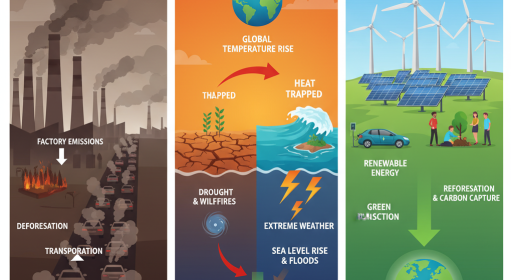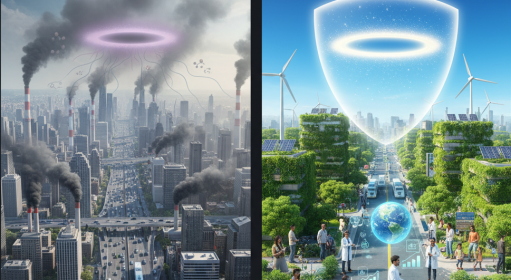The progression of human civilization has been marked by significant advancements in industrialization, technology, energy production, and military capabilities. While these developments have propelled economic growth and improved living standards, they have also led to substantial environmental degradation. This discussion explores the adverse effects of industrialization, technological advancement, nuclear power, and warfare on our planet.
Industrialization and Environmental Degradation
Industrialization has been a cornerstone of economic development, yet it has introduced several environmental challenges:
- Pollution: The rise of factories and mass production has led to significant air, water, and soil pollution. Emissions from industrial processes release pollutants that degrade air quality and contribute to health issues. Industrial waste often contaminates water bodies, harming aquatic ecosystems and posing risks to human health.
- Deforestation and Habitat Destruction: Expanding industrial activities require land, leading to deforestation and the loss of biodiversity. This not only disrupts ecosystems but also contributes to climate change by reducing the number of trees that absorb carbon dioxide.
- Resource Depletion: The relentless extraction of natural resources to fuel industrial processes has led to the depletion of essential materials and environmental degradation, affecting the planet’s ability to sustain life.
Technological Advancement and Environmental Impact
While technological progress has brought numerous benefits, it has also posed environmental challenges:
- E-Waste: Rapid technological obsolescence results in substantial electronic waste, which often contains hazardous materials that can leach into the environment if not properly managed.
- Energy Consumption: The proliferation of digital technologies and data centers has led to increased energy demand, often met by fossil fuels, thereby contributing to greenhouse gas emissions.
- Resource Exploitation: The production of electronic devices requires rare minerals, the extraction of which can lead to environmental degradation and habitat destruction.
Nuclear Power: A Double-Edged Sword
Nuclear energy presents both opportunities and challenges:
- Low Greenhouse Gas Emissions: Nuclear power plants produce minimal direct carbon emissions, contributing to cleaner air and aiding in climate change mitigation.
- Radioactive Waste: The generation of nuclear energy results in radioactive waste, which poses significant disposal challenges due to its long-lived radioactivity and potential environmental hazards.
- Risk of Accidents: While rare, nuclear accidents can have catastrophic environmental and human health consequences, contaminating large areas and rendering them uninhabitable.
- Water Usage: Nuclear plants require substantial water for cooling, impacting aquatic ecosystems and potentially leading to thermal pollution.
Warfare and Environmental Consequences
Armed conflicts have profound environmental impacts:
- Ecosystem Destruction: Military operations can lead to habitat destruction, deforestation, and loss of biodiversity.
- Pollution: The use of explosives and chemical weapons can contaminate soil and water sources, posing long-term environmental and health risks.
- Resource Strain: Wars often lead to overexploitation of natural resources, either to fund military efforts or due to displacement of populations, resulting in environmental degradation.
- Nuclear Warfare: The detonation of nuclear weapons would release massive amounts of soot into the atmosphere, potentially causing a “nuclear winter” with drastic temperature drops and agricultural collapse.
The advancements in industrialization, technology, nuclear energy, and military capabilities have undeniably shaped modern society. However, these developments have also imposed significant environmental costs. Addressing these challenges requires a concerted effort to implement sustainable practices, invest in clean technologies, and promote policies that balance progress with environmental stewardship. Only through such measures can we mitigate the adverse effects and work towards a more sustainable and resilient planet.




